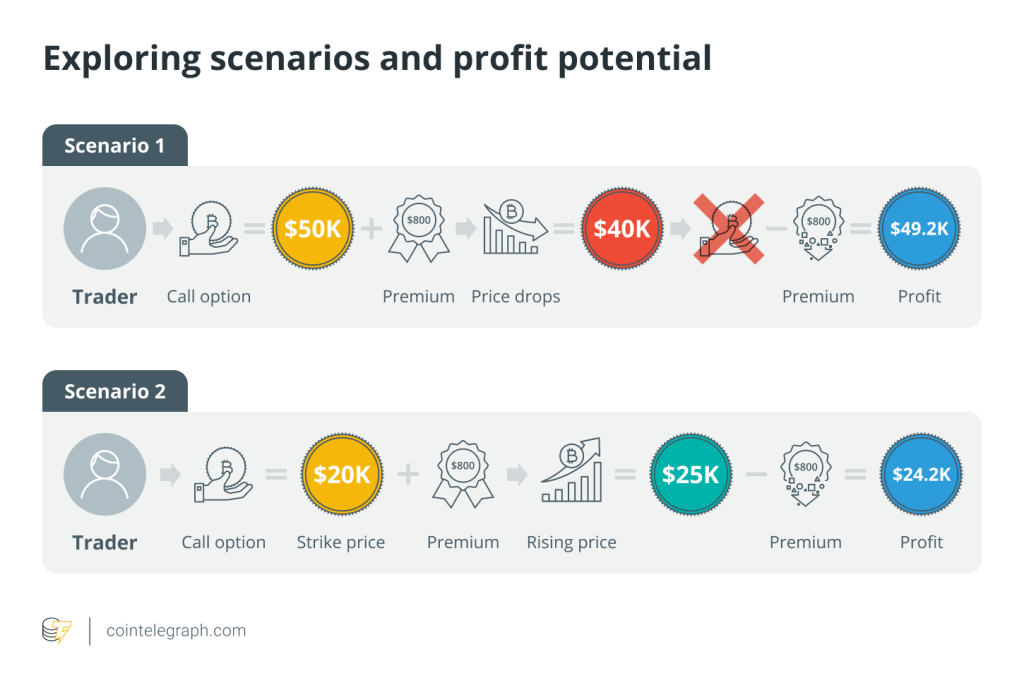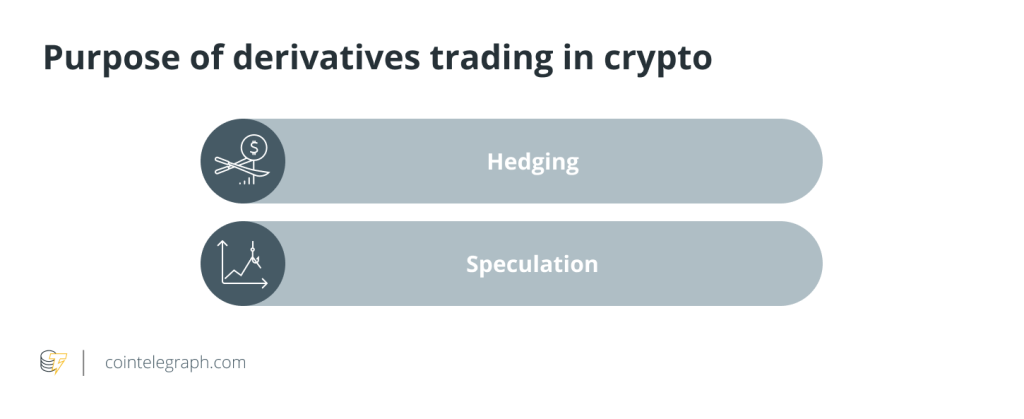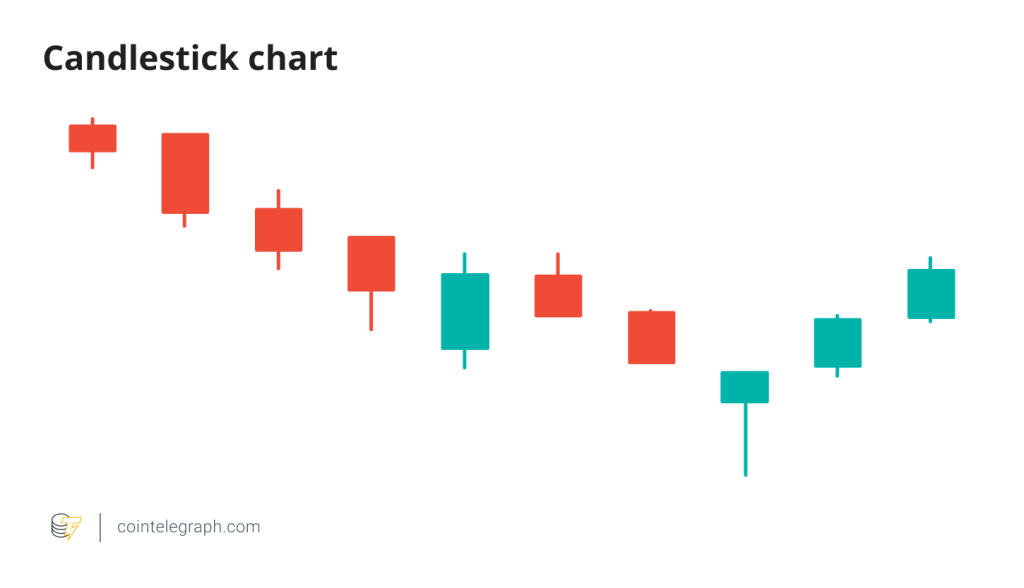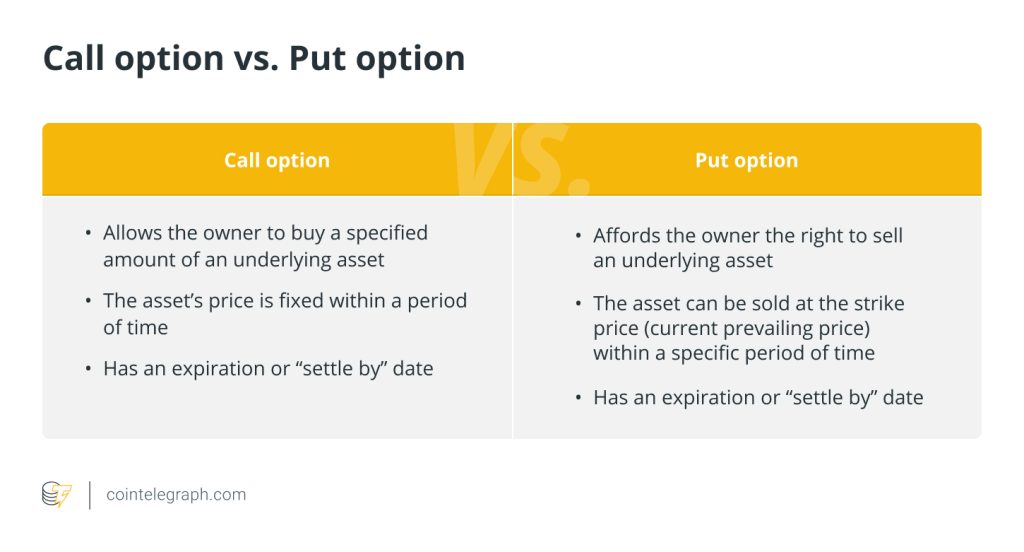How to buy and sell Bitcoin options

Discover how to speculate on Bitcoin’s price movements without owning the asset itself via Bitcoin options.

Bitcoin options contracts are a type of derivatives contract that allows investors to speculate on Bitcoin (BTC) price movements without owning Bitcoin itself. Bitcoin derivatives trading and investing in Bitcoin options are other routes that investors use to leverage the volatility of the cryptocurrency market.
Understanding Bitcoin options
In investing, a derivative is a product or contract with a value determined by an underlying asset. Cryptocurrency derivatives include futures, options and perpetual contracts. This basic Bitcoin options trading guide focuses solely on Bitcoin options, how investors trade them and some of the risks and strategies.
Here, a Bitcoin options contract derives its value from Bitcoin. Investors engage in speculating or “hedging” on the price volatility of Bitcoin. A Bitcoin options contract allows a trader to buy or sell Bitcoin at a previously agreed time and date.
In contrast to futures, an investor is not obligated to buy or sell an asset at the contract expiry date if they decide otherwise. For instance, if the price of Bitcoin falls, an investor might choose not to buy at the contract price because that’s now higher than the actual value of the crypto. However, each options contract has a price, called a premium, and this must be paid regardless of whether or not the investor goes ahead and the trade takes place. Trading platforms may also charge service fees in addition to the premium.
Types of Bitcoin options
There are Bitcoin call and put options, as well as American and European options.
- Call options — Allow a trader to purchase Bitcoin on a pre-agreed date
- Put options — Allow a trader to sell Bitcoin on a pre-agreed date
- American options — Can be executed any time before the contract expiry date
- European options — Allow a holder to exercise the option only at the expiration date.

Bitcoin options contracts are, in essence, promises to trade Bitcoin in the future. An option has an expiry date, which is when the contract is executed if the investor goes ahead. Or, American options, as noted, can be executed before the contract expiry date.
Options can be physically settled or cash settled per the contract. To settle Bitcoin options physically, Bitcoin would be transferred to the purchaser’s cryptocurrency wallet or to their account on a trading platform. If it’s a cash settlement, the exchange is made in fiat currency.
A basic example to understand how Bitcoin options work
Each options contract has an expiry date, and depending on the type of options contract (American or European), the contract must be executed before or by the expiry date.
Suppose an investor buys a Bitcoin call option at $50,000, for which they pay a premium of $800. If Bitcoin’s price drops to $40,000, the investor can opt not to exercise the option, thereby avoiding a $10,000 loss but forfeiting the $800 premium.
In another scenario, if the investor buys a Bitcoin call option at $20,000 (known as the strike price), and the price of Bitcoin rises to $25,000. The investor, in this case, may exercise the option, potentially making a $5,000 profit, minus the premium and any additional fee.

Important terms to understand Bitcoin options pricing
There are three terms used for Bitcoin options pricing, including:
In the money (ITM)
“In the money” refers to executing the option for a profitable trade.
Call option
A call option is ITM when the market price of Bitcoin exceeds the strike price of the option. This implies that if the option is exercised, the option holder may purchase Bitcoin for less than its current market value, which might result in a beneficial scenario.
Put option
A put option is ITM when the market price of Bitcoin is lower than the strike price of the option. This allows the option holder to sell Bitcoin at a price above the current market value, which can be profitable if the option is exercised.
At the money (ATM)
“At the money” isn’t about making a profit or a loss on the options contract, but taking advantage when it becomes profitable.
Call or put option
A call or put option is ATM when the market price of Bitcoin is equal to the strike price. While there’s no immediate profit to be made from exercising the option, it’s on the brink of becoming profitable with any upward movement in the market price.
Out of the money (OTM)
“Out of the money” refers to executing a trade that’s not profitable.
Call option
A call option is OTM when the market price of Bitcoin is lower than the strike price. Exercising the option would result in a loss because the option holder would be buying BTC at a price above the current market value.
Put option
A put option is OTM when the market price of Bitcoin is higher than the strike price. In this case, exercising the option would lead to a loss because the option holder would be selling Bitcoin at a price below the current market value.
The premium, which is the price or fee for buying the option contract, is calculated based on the price of the asset, market volatility, the length of the contract and the strike price. It will also depend on whether the option is ITM, ATM or OTM.
Bitcoin options trading for beginners
Trading cryptocurrencies and their derivatives, like Bitcoin options, involves significant complexity and risk. There are also risks in buying (and owning) and selling cryptocurrency directly, for example, on a cryptocurrency exchange.
Newcomers to the cryptocurrency market often start by engaging in direct trades on exchanges to familiarize themselves with the market dynamics before delving into the more complex world of derivatives and options trading.
For those interested in exploring Bitcoin options and derivatives, many platforms offer demo accounts. These accounts allow beginners to learn about the intricacies of derivatives trading in a risk-free environment, using simulated funds instead of real capital.
Bitcoin options trading platforms
Bitcoin options trading can be available on traditional derivatives trading platforms that also offer exposure to other assets, like stocks or gold. Crypto options trading is also available on some major cryptocurrency exchanges, including OKX, Bybit, Binance, Coinbase and Kraken.
Investors may choose to start Bitcoin options trading on a familiar platform, or they may choose to open a new account on a reputable platform or exchange known for its robust trading features.
How to trade Bitcoin options
This is the typical route an investor or trader will take to buy or sell Bitcoin options once they understand how derivatives and options work and have decided on a strategy to suit their risk tolerance.
The steps will vary according to the type of contract, its terms and the platform.
Step 1: Carefully choose a platform or exchange, considering factors such as security, fees, available contracts and user interface.
Step 2: Sign up and complete any necessary verification processes required by the chosen platform.
Step 3: Deposit funds in crypto or fiat, depending on the platform’s requirements.
Step 4: Locate the derivatives or options section on the platform and familiarize yourself with the interface and the types of options contracts available.
Step 5: Choose a call or put option based on trading strategy, market analysis and understanding of options contracts, considering fundamentals like strike price, expiry date and premium.
Step 6: Enter the details of your trade, such as the size of the contract (number of options) and the price you’re willing to pay. Review and confirm your order.
Step 6: Monitor the crypto market, contract or “position” to stay informed.
Step 7: Decide whether to exercise the option (if ITM and it’s an American option), hold it until expiry, or sell the option contract before expiry to close your position, depending on market conditions and your strategy.
Bitcoin options strategies
One way that investors use Bitcoin options contracts is to hedge on the expected price of Bitcoin, a risk management strategy used to offset potential losses in investments. For instance, an investor looking to hedge against potential price decreases in Bitcoin might purchase a put option. This option gives them the right to sell Bitcoin at a predetermined price, protecting them if the market price falls below this level.
Conversely, an investor optimistic about Bitcoin’s price might buy a call option, giving them the right to purchase Bitcoin at a set price in the future, potentially profiting if the market price exceeds this level.
Advanced Bitcoin options trading techniques
There are many advanced Bitcoin options trading strategies for experienced Bitcoin options traders with multiple positions and contracts in play to balance their risk. These include the covered call, protective put, long call spread and long put spread, to name just a few.
Holding the underlying asset (Bitcoin) while selling a call option is known as a covered call. Income can be made from this, but the upward potential is limited. To hedge against a significant price decrease, a protective put strategy involves purchasing a put option in addition to owning the underlying asset.
Spreads known as long call and long put entail purchasing and selling options with various strike prices or expiration dates to control the investment’s cost and specify possible gains and losses.
Successful traders deeply understand the cryptocurrency markets and Bitcoin derivatives trading products, including how to buy and sell Bitcoin options effectively. They develop a carefully planned strategy and know their risk tolerance, ensuring they only invest what they can afford to lose.
Risk management in Bitcoin options
Bitcoin options may be attractive to institutional investors, as derivatives are a more familiar investment mechanism. If they are settled in cash, the investor can speculate on Bitcoin price volatility without owning Bitcoin itself. Bitcoin options, like cryptocurrencies and other investments, still have risks.
The main risk is the extreme price volatility of Bitcoin, which can result in significant losses in value should the market move unfavorably. Furthermore, there is a greater chance of fraud and market manipulation due to a lack of regulation in the cryptocurrency market.
Various tactics are available to investors to help them manage these risks. Spreading investments over different assets can help reduce the impact of a single asset’s poor performance, which is why diversification is so important. Additionally, setting stop-loss orders allows the automatic sale of holdings at a preset price and can help limit losses.
Moreover, hedging techniques can counteract losses on Bitcoin bets, such as purchasing protective puts or selling covered calls. It’s also critical to keep up with legislative developments and market trends, as these can significantly impact the price of Bitcoin. Risk management tools created especially for Bitcoin markets can also facilitate effective monitoring and management of risk exposure.
This article does not contain investment advice or recommendations. Every investment and trading move involves risk, and readers should conduct their own research when making a decision.






Responses